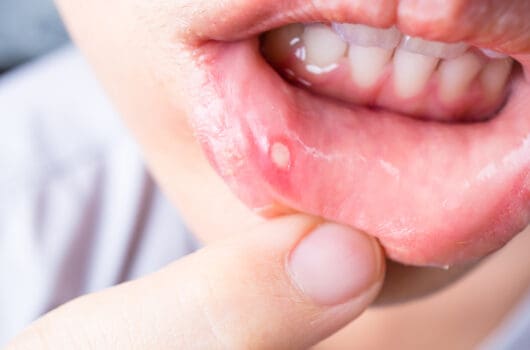When you’re pregnant, you experience a lot of physical changes. However, one part of your body that you probably didn’t think would be any different is your mouth. Yet your teeth and gums can undergo some adjustments as the hormones associated with pregnancy kick in, and one side-effect which is little-discussed is canker sores, otherwise known as mouth ulcers.
These welt-like little spots can appear on the inner cheeks, lips, or tongue and cause irritation and pain. If you’re asking why you’re suffering from mouth ulcers during pregnancy, read on to discover some expert information and advice.
- Are There Different Types of Mouth Ulcers?
- What Are the Symptoms of Pregnancy-Related Mouth Ulcers?
- Why Do Canker Sores Occur During Pregnancy?
- What Should I Do if I Develop Mouth Ulcers During Pregnancy?
- Are There Any Home Remedies for Mouth Ulcers in Pregnancy?
- Are My Mouth Ulcers a Sign of a More Serious Problem?
- Can Canker Sores Be Prevented in Pregnancy?
Are There Different Types of Mouth Ulcers?
Although you may think that all mouth ulcers are the same, in fact, there are several different types.
Minor ulcers are especially common in pregnancy, and particularly in the first trimester when hormone levels are rising rapidly. These ulcers typically measure around 2mm to 9mm and usually occur on the tongue, gums or base of your mouth. These ulcers can take as long as ten days to heal if they occur on the gums or lips, and if they occur on the tongue they can take as long as 12 days to go away. Usually, though, they won’t require any treatment and will resolve themselves eventually over time.
Pregnant women less commonly suffer from major ulcers which are around 10mm in diameter. These larger canker sores can take weeks or even months to fully heal. They too can appear on the tongue’s surface as well as on the gums or in the base of your mouth. They may even be found in the throat. Scars can be left behind by this type of ulcer and they are very painful. If you develop one of these, you should see your doctor for treatment.
The third type of mouth ulcer is the herpetiform ulcer. This is actually less of a sore and more of a virus. Its diameter is very small at only about 1mm. Usually, these ulcers appear in several places but crop up in clusters that can number dozens of spots. Healing can take between 2 and 3 weeks, and scarring can be left behind.
There are a few symptoms associated with mouth ulcers in pregnancy. You may spot patches of red, white, gray or pink on the affected area of your mouth and you may experience a sensation of burning. Often, you will have discomfort or even pain. It may be hard to talk or eat when you have developed a mouth ulcer.
Why Do Canker Sores Occur During Pregnancy?
Many things happen in your pregnant body which make you far more prone to mouth ulcers or canker sores at this time. These include:
- Changes in your hormones – during pregnancy, your body goes through many hormonal changes that affect how your body reacts to toxins. These hormonal changes also affect the supply of blood to your gum tissue and this can make you more likely to develop oral health problems.
- Vitamin deficiencies – several different types of food are known to cause mouth ulcers. Wheat, chocolate and citrus fruit are all linked to canker sores. Yet, there is a different dietary cause during pregnancy that could be causing your oral problems – vitamin deficiencies. A lot of happening inside your body at this time, so it can be hard to get sufficient nutrition. If you cannot consume sufficient vitamins and nutrients, mouth ulcers can be the result, so make sure you get enough zinc, folic acid and vitamin B12 in your diet.
- Stress – although pregnancy is meant to be a wonderful time in any woman’s life, in fact, it can be extremely stressful. Not only are you trying to cope with bodily changes, you’re also preparing for the challenges of a brand new baby while trying to continue with your daily life and existing responsibilities. It’s no wonder, then, that your body may be physically reacting to the stress and a common symptom is mouth ulcers.
- Destabilised immunity – during pregnancy, mouth ulcers could be a sign of having a weaker than usual immune system (something that is quite normal at this time) or they could be a symptom associated with a viral infection.
What Should I Do if I Develop Mouth Ulcers During Pregnancy?
If you’ve discovered a canker sore on your lips, gums or tongue during pregnancy, don’t panic – there are several things that you can try. First, make sure you’re following a regular oral hygiene routine. Brush your teeth at least twice daily with a good-quality toothpaste, floss and use mouthwash.

If you’ve found that the toothbrush you usually use is causing irritation to the site of the ulcer or your gums, try switching to a toothbrush that has softer bristles. Also, try to brush your teeth more carefully and slowly to avoid accidental abrasions. It’s also possible to purchase pastes and creams that you can put onto the ulcer to reduce the pain and discomfort, but you should talk to your doctor or a pharmacist before doing this to make sure you’ve chosen a product that is safe for use during pregnancy. You should also avoid eating any foods or drinking any beverages that are known to irritate mouth ulcers or cause more to develop.
Since your oral health is more vulnerable during pregnancy, you should aim to go to your dentist once at least for a clean and a check-up. Make sure your hygienist and dentist are aware that you’re pregnant as they will then be able to give you the care that you need without exposing you to any potentially harmful anesthesia or X-rays.
Usually, mouth ulcers are self-limiting, however, if they’re causing considerable pain, appear to be inflamed, last for more than 3 weeks or recur frequently, talk to your dentist or doctor and get some medical advice.
Are There Any Home Remedies for Mouth Ulcers in Pregnancy?
There are a few things you can try at home that will reduce the discomfort and pain associated with pregnancy-related canker sores:
- Avoid eating any foods that are acidic or spicy as these will irritate mouth ulcers
- Avoid smoking or chewing tobacco. Not only is it unhealthy during pregnancy for you and your baby but it will also make your canker sores worse
- Try rinsing out your mouth with some salt water or try applying a mixture of water and hydrogen peroxide (made up of equal parts) on your sores
- Apply some ice cubes to the affected areas to relieve the swelling and pain.
- Rinse your mouth with hexadine mouthwash 2 or 3 times daily to kill any bacteria
- Try consuming carrot, celery and cantaloupe juices (it’s wise to talk to your doctor first, though)
- Drink plenty of water to stay well-hydrated but avoid any fizzy or acidic drinks as they can exacerbate the problem
Are My Mouth Ulcers a Sign of a More Serious Problem?
You should discuss with your doctor any symptoms that are causing you concern during your pregnancy. While most canker sores aren’t a serious problem to worry about, there are a few things you should be aware of that could signal your issue is something more than just a mouth ulcer.
Usually, canker sores will last for no more than a couple of weeks. If yours persists, tell your doctor.
Usually, mouth ulcers are painful. If yours isn’t painful, you should see your doctor. A cancerous mouth ulcer may be painless at first however, it may feel tender. It also won’t heal even after a few weeks.
If you any lumps in your mouth that fail to heal up or go away within a few weeks, consult your physician for advice.
Can Canker Sores Be Prevented in Pregnancy?
Although mouth ulcers in pregnancy are more common, they aren’t necessarily going to cause you any problems. There are several things you can do to care for your oral well-being and your overall health that will keep canker sores at bay.
Try to minimize the stress you experience and get enough rest every day. This will benefit you all through your pregnancy as worrying not only increases your chance of developing mouth ulcers but it has also been linked to other pregnancy complications.
Make sure you choose healthy foods too which offer optimal nutrition without irritating your mouth. Of course, brushing frequently and using floss and mouthwash each day will give you the best chance of maintaining excellent oral hygiene all through your pregnancy.
Follow this expert advice and you should find that you have minimized your chance of experiencing mouth ulcers during your pregnancy and, should they arise, you will now know how to deal with them. Although canker sores can be irritating at the best of times, and especially during pregnancy, they aren’t usually any cause for concern and will soon go away on their own.
